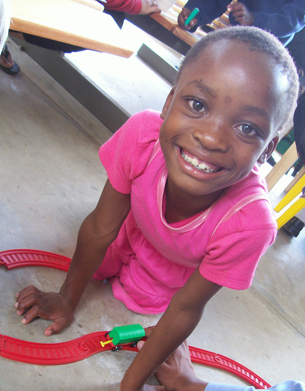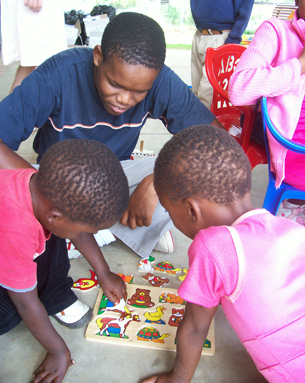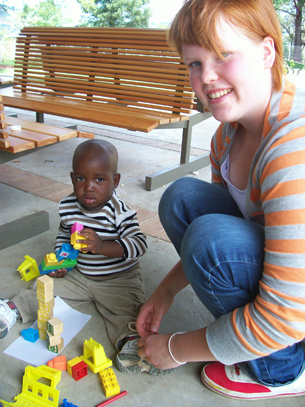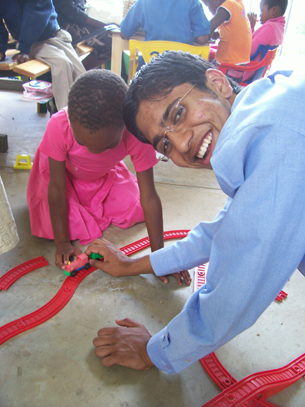Nosipho Storer, the administrator of the Seamus Fund in Swaziland, sends frequent updates about the ways that Seamus Fund has helped the least fortunate persons in Swaziland, especially children.
Here are excerpts from some of her letters.
June 2009:
“SD is a 19 year old boy who has MDR TB and recently suffered a stroke on his left side. His prognosis is poor but he is rich in sprits and optimism. His positive spirits have lengthened his life, and he has made it on longer than we all expected. At the end of May, he started to display and altered mental state, and was in need of a head CT scan. This resource is only available in one place in the country – a private clinic- and it’s not cheap. Through the Seamus fund, we were able to fund the head CT scan, which in turn informed our intervention for him more efficiently. It cost E2600. His prognosis is still poor, and we don’t know how much longer he has to live. However, through the Seamus fund, we plan to make the remainder of his life as painless as possible and as happy as possible.
PN is an 8 year old girl patient of Baylor’s at one of the outreach clinic sites. Her physical condition has been deteriorating and she was recently diagnosed with meningitis. She also displays altered mental state. Our pediatrician needed a CT scan to assess both the diagnosis and prognosis of this patient. This was made possible by the Seamus fund, and E2339.49 was allocated to assist this patient o access this service.
The Seamus Fund has been critical in paying the Hospitalization of critically ill patients. For many patients, it is not clear how long their hospital stay will be as they suffer from many physical illnesses in addition to HIV/AIDS. The government hospital mandates that payment for admission is made on discharge. Many patients opt not to go for admission to the government hospitals as they do not foresee themselves affording the care. As you can imagine, this has lead to multiple and needless deaths. The Seamus fund has been able to guarantee many families assistance in this regard, and because of this, many children’s lives have been saved.
Baylor Clinic has an emergency room facility where patients with severe and sometimes life threatening illnesses are seen. Hence, emergency room patients need to be speedily attended to and stabilized. Once stable, many of these patients are then transferred to government hospital facilities for admission and further clinical management. We noted that many of our babies who are being admitted into hospitals lacked basic essentials such as nappies, clothing, soaps, Vaseline and baby blankets. This compromises the quality of their stay during admission. We then used the Seamus fund to assemble a makeshift ‘hospital pack’ that could be provided to needy children in such situations.
Thank you once again for all the help that you have given to the children of Swaziland. Because of your help, many lives have been saved. Words cannot express how immense that is. May you always be blessed.
I thank you. God bless you.”
March 2009:
“Recently the fund has been assisting young children (ages 10 to 18 years) with transport fee come to the monthly support groups. Children come from all parts of the country to access care and support here at the clinic. This is so important because many of them have no platform to otherwise access psychosocial support. Our culture frowns upon open discussions of sex, sexuality, and HIV/AIDS. Over 100 children attend the support group each month, where we educate them on HIV/AIDS literacy and give them as much support as possible.
The Seamus Fund has been assisting people in starting up small income businesses for self sustainability. This includes selling foodstuffs (fruits, vegetables, meals, snacks) at local schools, churches, and bus stops. It was decided that it would be of benefit to the patient to return this money- interest free- in monthly installments. This would facilitate a greater sense of ownership over their business and its success, and enable more sustainability of the Seamus fund.
The Seamus Fund ahs been used to purchase baby food and baby formula for babies in need at the clinic. This is especially for cases of desperation and malnutrition. These babies are able eat something while they wait in the waiting area, and take something home to complement the little food they access from home.”
February 2009:
“Zakhele is a 12 year old boy who came to Baylor clinic all alone yesterday. He said to us on arrival that came yesterday that the wanted to live and be healthy. He spoke to myself and the Medical Director. Because he is too young to sign the consent, he was given bus fare from the Seamus Fund to return today with senior brother. All clinical investigations started yesterday. Zakhele was also given Seamus funding to obtain a chest X-ray, which was part of the clinical investigation. He came again today with his older brother who explained that he is the only one of 5 brothers looking after Zakhele. All the brothers share the same the mother but different fathers. He says that some time ago his mother secretly took Zakhele to SA to stay with distant relatives. He stayed there for a year. His older brother reported him missing to the police (SWAPOL), but to no avail. He then located the child in South Africa, and went to look for him. However, his mother refused to release him. She returned to SD when she was near death in mid 2008; by this time Zakhele had deteriorated physically and was severely malnourished. He has been staying with his senior brother ever since. This brother is unemployed but wants to start a chicken business. He was given E200 seed grant from the Seamus Fund for this, which he will account for at next visit. His HIV positive results disclosed today.
Nkosingphile is a 23 year old mother of 2 year old Fisokuhle. She lives in a polygamous homestead with several stepmothers. Her birth mother is deceased. Her father discriminates severely against people living with HIV/AIDS. Because she is not married, her father wants to kick her out so she can ‘be a burden’ to he baby’s father’s family. However, her baby’s father denied paternity and has rejected them both. Nkosingphile is unemployed and struggles to maintain herself and her son. Fisokuhle has been failing to thrive. Through the Seamus fund we have been able to give her a seed grant to start an income generating project. Yesterday, her son needed urgent admission into the Mbabane Government Hospital for gastric lavage and TB re-infection. She could not oblige to this admission as she lacked the admission fee and worried about who would pay for them. The Seamus fund made it possible for her son to be admitted and to receive adequate care.
These stories really touched me because without the Seamus Fund these patients would not have had a chance.”




